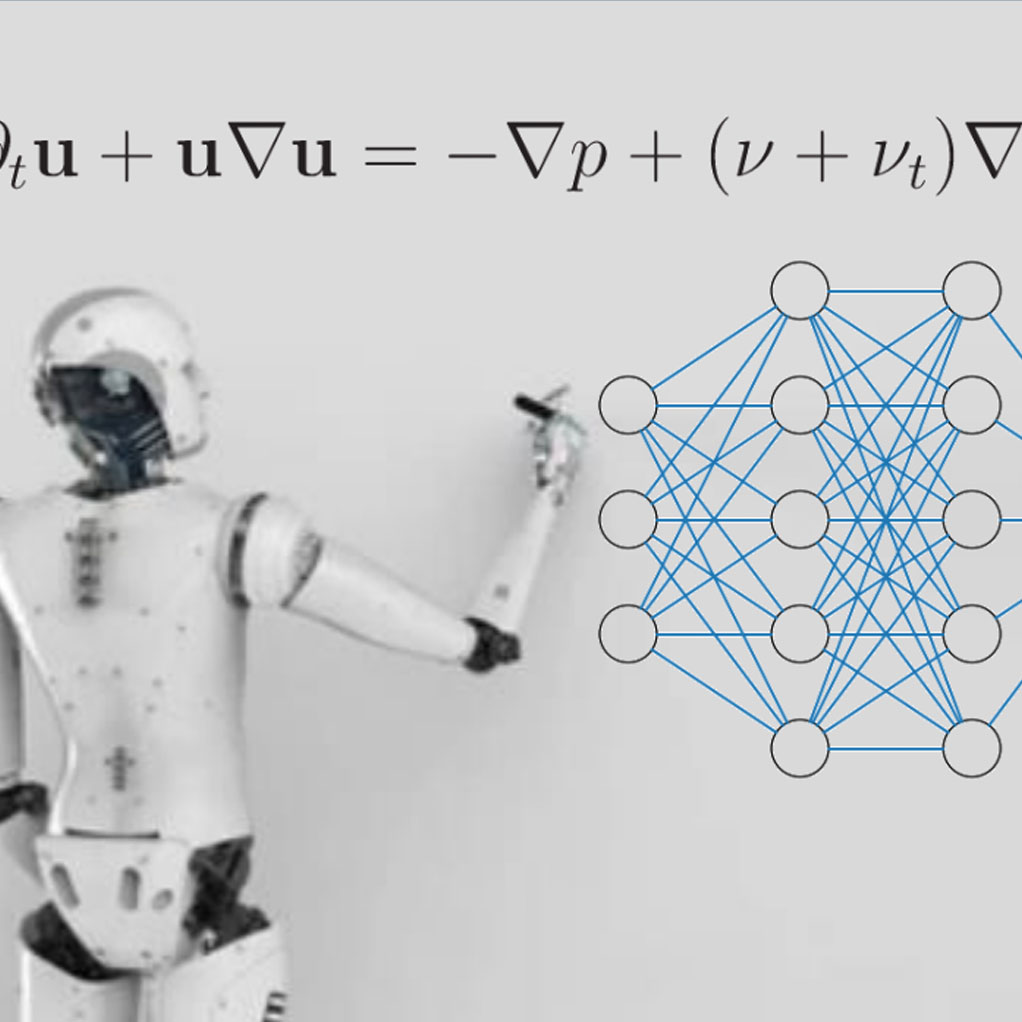
Motivation
Big data and machine learning are driving comprehensive economic and social transformations and are rapidly re-shaping the toolbox and the methodologies of applied scientists. Machine learning tools are designed to learn functions from data with little to no need for prior knowledge. As continuous developments in experimental and numerical methods improve our ability to collect high-quality data, machine learning tools become increasingly viable and promising in disciplines rooted in physical principles. Fluid dynamics is one of them.
Objectives
This course gives an overview and practical hands-on experience in integrating machine learning in fluid dynamics. The course originated as a compressed version of the course Machine Learning for Fluid Dynamics, given at the Research Master program at the von Karman Institute. After a brief review of the machine learning landscape, we show how to frame problems in fluid mechanics as machine learning problems, and we explore challenges and opportunities. Attendees will be guided through a series of tutorial sessions in Python and will tackle several relevant applications: aeroacoustics' noise prediction, turbulence modelling, reduced-order modelling and forecasting, meshless integration of (partial) differential equations, super-resolution and flow control.
Approach
All lectures consist of a short theoretical session and a set of practical exercises using Python. Moreover, several group exercises will be provided. These are working sessions in which the role of the instructor is marginal, and participants should be able to complete their assignment independently. These will provide hands on experience and consolidate the understanding of the provided tools.
Pre-requisites
The course pre-requisite is a basic understanding of Python programming and basic knowledge of Calculus, Linear Algebra and Fluid dynamics. The course is pitched for undergraduate and graduate students alike, as well as practitioners in the fields.
Certificates
Monday 27 January 2025: Introduction and Fundamental of Optimization
08:00 Registration
08:45 Welcome Address and Course Introduction
09:00 Lecture 1: What is Machine Learning?
Miguel A. Mendez, von Karman Institute
10:30 Coffee Break
11:00 Lecture 2: Exercises on Regression and Uncertainty Quantification
Miguel A. Mendez, von Karman Institute
12:30 Lunch Break
14:00 Lecture 3: A Review of Optimization Tools
Pedro Marques, von Karman Institute
15:30 Coffee Break
16:00 Lecture 4: Bio-Inspired Optimization: Genetic Algorithms and Particle Swarms
Miguel A. Mendez, von Karman Institute
17:30 End of day
Tuesday 28 January 2025: Regression Methods from Machine Learning
09:00 Lecture 5: Regularized and Constrained Radial Basis Functions
Manuel Ratz, von Karman Institute
10:30 Coffee Break
11:00 Lecture 6: The Bayesian Formalism and Kernel Methods
Miguel A. Mendez, von Karman Institute
12:30 Lunch Break
14:00 Lecture 7: Gaussian Processes and Bayesian Optimization
Miguel A. Mendez, von Karman Institute
15:30 Coffee Break
16:00 Lecture 8: Artificial Neural Networks and Deep Learning
Mr. Jan Van den Berghe, von Karman Institute
17:30 End of day
Wednesday 29 January 2025: Regression Methods for Dynamical Systems
09:00 Lecture 9: Machine Learning for Turbulence Modeling
Matilde Fiore, von Karman Institute
10:30 Coffee Break
11:00 Lecture 10: Neural ODEs and Dynamical Systems
Samuel Ahizi, von Karman Institute
12:30 Lunch Break
14:00 Lecture 11: Statistical Tools for Data Assimilation: The Kalman Filter
Miguel A. Mendez, von Karman Institute
15:30 Coffee Break
16:00 Lecture 12: Variational Tools for Data Assimilation: The Adjoint Method
Miguel A. Mendez, von Karman Institute
17:30 End of day
Thursday 30 January 2025: Dimensionality Reduction
09:00 Lecture 13: Linear Autoencoders and Data Driven Modal Analysis
Miguel A. Mendez, von Karman Institute
10:30 Coffee Break
11:00 Lecture 14: Manifold Learning and Nonlinear methods
Miguel A. Mendez, von Karman Institute
12:30 Lunch Break
14:00 Lecture 15: An Introduction to Variational Autoencoders
Joachim Dominique, Cenaero
15:30 Coffee Break
16:00 Lecture 16: Exercises on Dimensionality Reduction
Pedro Marques and J. van den Berghe, von Karman Institute
17:30 End of day
Friday 31 January 2025: Flow Control and Digital Twinning
09:00 Lecture 17: Fundamentals of Optimal Control Theory and Reinforcement Learning
Miguel A. Mendez, von Karman Institute
10:30 Coffee Break
11:00 Lecture 18: Value-based vs Policy-based Reinforcement Learning
Lorenzo Schena, von Karman Institute
12:30 Lunch Break
14:00 Lecture 19: The Actor-Critic Formalism in Reinforcement Learning
Romain Poletti, von Karman Institute
15:30 Coffee Break
16:00 Lecture 20: Reinforcement Twinning: From Digital Twins to Model-Based Reinforcement Learning
Miguel A. Mendez, von Karman Institute
17:30 End of day
| on-site - Undergraduate Students (Proof Needed) | 315.0 |
| on-site - PhD Students (Proof Needed) | 864.0 |
| on-site - Recognized Universities / Research Center | 1368.0 |
| on-site - Commercial Organizations | 1728.0 |
| on-site - Special Registration | 0.0 |
| on-site - Lecturer | 0.0 |
| online - Undergraduate Students (Proof Needed) | 283.5 |
| online - PhD Students (Proof Needed) | 777.6 |
| online - Recognized Universities / Research Center | 1231.2 |
| online - Commercial Organizations | 1555.2 |
| online - Special Registration | 0.0 |
| online - Lecturer | 0.0 |
*Fees are VAT included.
*Additional Discounts (if applicable, i.e. Nato membership) are applied at checkout.
**Prices include early bird -10% discount.
Hands on Machine Learning for Fluid Dynamics 2025
**Early Bird Limit: Nov. 27, 2024
By purchasing this product you agree with our sales conditions.